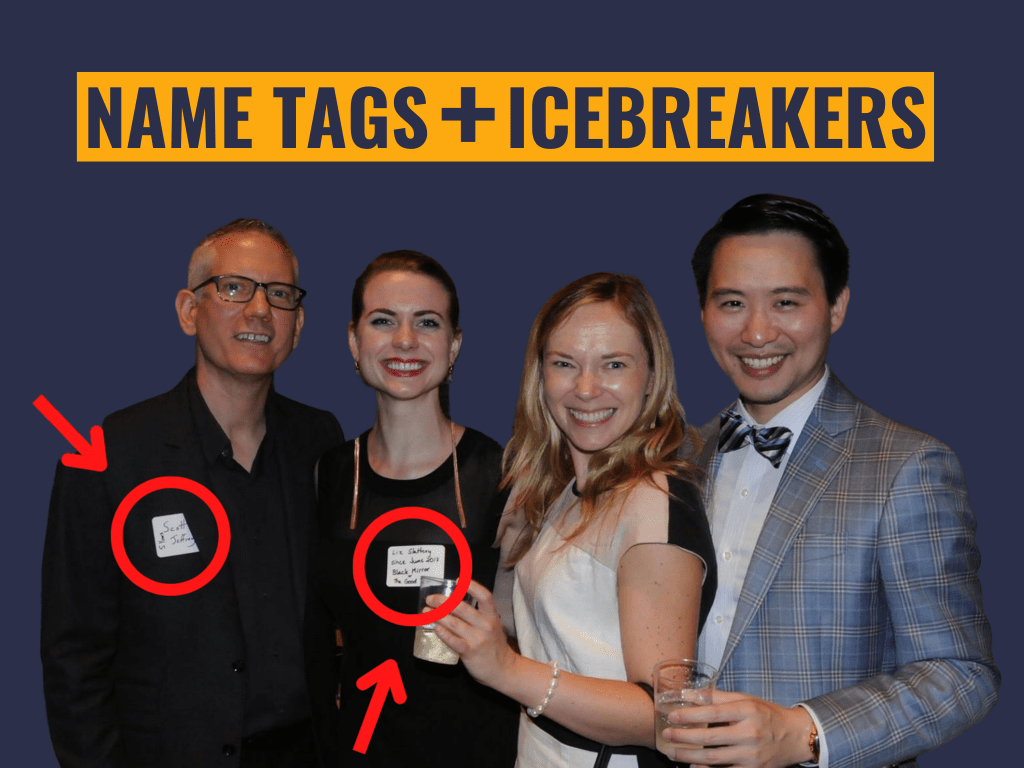Last updated: December 4, 2024
Networking events don’t have to be lame.
There are a few things you can do to plan a productive, fun networking event.
My favorite tips are:
- Give yourself at least 3 weeks for the event runway
- Use name tags for everyone attending (no exceptions!)
- Host your event on a Monday, Tuesday, or Wednesday evening
- Send 3 key reminder messages
- Take a group photo at the end
December 2024 Update: I’ve added more about modern networking activities that actually work and I personally use for my events.
You’ll discover:
- Simple ways to get people moving and talking
- Effective group activities that create real connections
- How to make networking less awkward for introverts
- Smart ways to facilitate learning while networking
Keep reading and I’ll outline why each of these things are important.
Why you should trust me: I’ve hosted hundreds of networking events and cocktail parties in New York City and Austin, Texas. New York Magazine once called me a host of “culturally significant” parties. But don’t take their word for it. Keep reading to see my tips that will help you meet new people.Promote Your Event 3 Weeks Away
Give yourself at least three weeks to invite colleagues and promote your networking event.

Nobody likes attending something with very few attendees. When you give yourself plenty of time to line up your RSVPs, your party will be a much bigger success.
Ideas to Promote and Invite New People
- Visit Facebook or LinkedIn groups that pertain to your event’s niche. Let them know you’re planning an event and looking for feedback and attendees.
- Look for Meetup groups in your town, especially for new residents.
- Lots more ideas to meet new people in this article: How To Make Friends When You Don’t Have Any
Collect RSVPs
Interaction with your party attendees through a lot of digital platforms can help spice up your event. You can send them a private message, have them vote in a poll, display your event’s schedule, and send announcements.
Read this to know more about event management platforms where you can collect RSVPs:
- Event Platforms: Pros, Cons, and My Favorites
- Top Evite Alternatives: 10 Platforms
- How to Make an RSVP Link for Meetups, Events, and Parties
Focus on a Narrow Niche
The riches are in the niches! I think someone famous said that.
But how does this apply to hosting or planning a networking event?
Well, instead of inviting a group of dentists in general, focus on creating an event only for orthodontists. They would have an easier time relating to one another and you’ll be seen as a super connector.
Be A Connector
This tip is obvious, but I need to say it: Your role at the party is to help introduce others. You should feel a sense of urgency to start (and end!) lots of new conversations during your networking event.
You are the single, central source of connections at this party. You’ll help others meet new people when you merge conversations, bridge groups, and introduce new arrivals.
Help Everyone Meet with Icebreakers
I’m a huge fan of icebreakers. In fact, I wrote a whole book that features them: The 2-Hour Cocktail Party.
These articles will show you more about icebreakers and how you can use them at your event:
- Icebreakers on Name Tags: How to do it RIGHT
- Speed Icebreakers: How to Do Them
- Icebreakers: The Ultimate Guide

Pro Tip: Look for opportunities to introduce each guest to anyone else at the networking event.
Structured Networking Activities
Gone are the days of awkward mingling with drink in hand.
Modern networking events need structure to succeed. By incorporating planned activities, you create natural opportunities for connection while keeping energy levels high.
Here’s how to do it right:
Movement-Based Icebreakers
Get your attendees energized with these simple physical activities.
The Human Spectrum
- Designate one side of the room as “Strongly Agree” and the other as “Strongly Disagree”
- Ask industry-relevant questions
- Have participants physically move to where they align on the spectrum
- Encourage quick discussions with those standing nearby
Professional Musical Chairs
- Arrange chairs in two circles, facing each other
- Play music while participants walk around
- When music stops, they sit and chat with the person facing them
- Provide a specific discussion topic for each round
Network Mapping
- Have participants stand and form physical connections based on:
- Industries they work in
- Years of experience
- Skills they want to learn
- Skills they can teach
Pro tip: Keep physical activities simple and optional. Not everyone will be comfortable or able to participate in movement-based activities.
Small Group Rotations
Break your large group into smaller pods of 4-5 people:
- Give each group a specific challenge or topic
- Set a 10-minute timer
- Have groups rotate every 10 minutes
- End with quick shares from each group
Skill-Matching Sessions
Create intentional connections based on skills:
- Have attendees list one skill they can teach
- List one skill they want to learn
- Match people accordingly for 5-minute mini-mentoring sessions
Interactive Learning Components
Networking doesn’t have to be just about exchanging business cards. By adding learning elements to your event, you create more value for attendees while fostering deeper connections.
People bond better when they’re learning together. Here’s how to make it happen:
Lightning Learning Rounds
Quick-fire knowledge sharing:
- 2-minute presentations from willing participants
- Focus on specific industry tips or insights
- Allow for brief Q&A after each share
Expert Corners
Set up designated areas where experts can share knowledge:
- 15-minute rotating sessions
- Small group discussions
- Hands-on demonstrations
- Practice exercises
Innovation Stations
Create interactive demo areas that spark conversation:
- Set up product demonstrations
- Showcase new technologies
- Offer hands-on experimentation
- Include collaborative challenges
Examples of Innovation Stations:
- VR/AR experience demos
- 3D printing workshops
- AI tool demonstrations
- New software trials
- Prototype testing areas
Pro tip: Rotate specialists through each station to keep conversations fresh and provide expert insights.
Quiet Zones for Introverts
Create comfortable spaces for lower-energy networking:
- Designate clearly marked “quiet networking” areas
- Set up small tables for 2-3 people
- Provide conversation prompt cards
- Keep these areas away from music or loud activities
- Add comfortable seating and good lighting
Pro tip: Position quiet zones near refreshments or along natural traffic paths so introverts don’t feel isolated.
Problem-Solving Stations
Set up areas focused on common industry challenges:
- Create whiteboards or digital displays showing specific problems
- Encourage small group discussion and solution brainstorming
- Rotate people through different stations every 15 minutes
- Share solutions with the larger group at the end
Videos of Networking Events
A few years ago, I hosted a networking event for a women’s group at a conference. Watch this video to see how it went:
A few things that we did during this event included:
- speed icebreakers,
- the “Wall of Women” business card module,
- lightning talks, and
- The Map of the World mixer.
If you’d like to see me document and outline any of those modules, please email me to [email protected] and I will write them up.
While in New York, I hosted a networking event and made a video to show you how I did it.
Recruit Anchors to Engage People
This can be your secret weapon. Anchors are people who are comfortable, outgoing, and casual.
They’re sort of like your core group at a cocktail party. They will show up early, laugh at your jokes, and not follow you around being shy.

Ask them to help you by introducing themself to new people and making new friends. You can delegate duties to them, like writing name tags, getting drinks, or taking pictures.
Give them a role in the success of your networking event and they will be excited to play a part.
Follow Up With Your Guests
Send a thank you message the day after your networking event. Thank everyone for attending, and send them the group photo (as well as any other pictures).
Ask them if they’d like to be invited next time.
- Send out quick email after the event to follow up with everyone who attended
- Ask for feedback
Conclusion
This is a quick outline, but hopefully you get the basic idea.
When you host an event with a little bit of structure, you’ll be far ahead of all the “too cool to care” networking events who just show up, drink alcohol and hope to make new contacts.
For best results:
- Explain activities clearly at the start
- Use a timer or bell to manage transitions
- Have volunteers help guide people
- Keep instructions simple and visible
- Allow natural conversations to flow
Here are some key takeaways to keep in mind:
- Movement-based activities boost energy and create natural conversations
- Small group rotations ensure everyone meets multiple people
- Quiet zones make networking accessible for introverts
- Interactive learning components add value beyond simple networking
- Clear structure helps people feel comfortable participating
For even more networking advice, and to learn how you can build big relationships by hosting small gatherings, see my book: The 2-Hour Cocktail Party.


